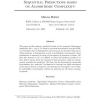Free Online Productivity Tools
i2Speak
i2Symbol
i2OCR
iTex2Img
iWeb2Print
iWeb2Shot
i2Type
iPdf2Split
iPdf2Merge
i2Bopomofo
i2Arabic
i2Style
i2Image
i2PDF
iLatex2Rtf
Sci2ools
107
click to vote
JCSS
2006
2006
Sequential predictions based on algorithmic complexity
This paper studies sequence prediction based on the monotone Kolmogorov complexity Km=-log m, i.e. based on universal deterministic/one-part MDL. m is extremely close to Solomonoff's universal prior M, the latter being an excellent predictor in deterministic as well as probabilistic environments, where performance is measured in terms of convergence of posteriors or losses. Despite this closeness to M, it is difficult to assess the prediction quality of m, since little is known about the closeness of their posteriors, which are the important quantities for prediction. We show that for deterministic computable environments, the "posterior" and losses of m converge, but rapid convergence could only be shown on-sequence; the off-sequence convergence can be slow. In probabilistic environments, neither the posterior nor the losses converge, in general. Keyword Sequence prediction; Algorithmic Information Theory; Solomonoff's prior; Monotone Kolmogorov Complexity; Minima...
Related Content
| Added | 13 Dec 2010 |
| Updated | 13 Dec 2010 |
| Type | Journal |
| Year | 2006 |
| Where | JCSS |
| Authors | Marcus Hutter |
Comments (0)

